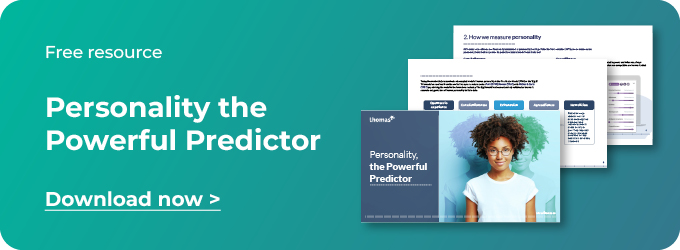The “Type A personality” is well known, but what about the other types? Yes, there are three more, B, C, D. Well, today in this guide you are going to learn more about Type D personalities.
In brief, the Type D Personality is the existentialist one. They like to take a slower, easier pace toward their work and life in general. Understanding this type of personality along with the other three is going to be key in getting a better understanding of your workforce, who you may be more like, and how it can affect recruitment decisions.
We are going to take a look at this personality type and understand in more detail what it means to have a Type D personality. In this guide, we will get a better understanding of the impact of this behavior and why understanding this personality type is important in the recruitment process. Finally we will discuss how Thomas assessments can help you find out what personality type your candidate has.
What is the Type D personality type?
Simply put, the Type D Personality is the existentialist one. They are calm on the surface and enjoy things to remain the same as long as possible. They are viewed as the personality type that is more gloomy, sad, depressed compared to the other three.
You can be forgiven for thinking that Type D personalities are just seen as almost manic depressive, but that’s far from the case. They are hard working in nature, they are people pleasers like Type B but want to know that they are needed for their work rather than being validated over just who they are. They require a sense of security and believe that taking risks or change is actually quite dangerous and imposing on life balance.
Type D personalities are also highly compassionate, championing others whilst showing thoughtfulness and caring. They are seen as “supporters” allowing other people to celebrate their victories and helping them to achieve their goals.
They are also extremely diligent, being capable of doing very repetitive tasks whilst maintaining a level and care of detail. Variety or change is not welcome.

What it means to have a Type D personality
We now have an understanding of what a Type D personality is and how they can behave within the workplace but what are the main characteristics that make a Type D Personality stand out? Here are just some of the more commonly associated traits.
Feelings of worry
Type D personalities suffer with commonly held ideas about worry and concern. This is relevant to their lives and not towards their job.
Sadness
Again, this trait is very common with Type D personalities. But this is not something that should put you off. When they find the happy balance and medium of their life and work, they can be incredibly happy and diligent workers, completing specific tasks.
Irritability
If something isn’t going according to plan - a plan which they would have laid out for themselves, this can increase irritability towards either other people or the task at hand.
Pessimistic outlook
This is to do with a lot of over-thinking about situations and the Type D personality is quick to see what is wrong with the situation rather than focus on what could be right.
Negative self-talk
This is common, especially for all the other matters raised. It becomes a perpetual cycle where to reinforce the belief systems, negative self-talk is used rather than being optimistic about the situation.
Avoidance of social situations
Whether it is avoiding other people or struggling to even introduce themselves, the Type D personality will rarely go into social situations where they don’t know anyone. This is serial introversion that can be quite limiting in some circumstances.
Lack of self-confidence
Not believing their own abilities is very common for this personality type. They need plenty of encouragement and need to be shown that they are of great value to overcome this confidence issue.
Fear of rejection
This is again a very common trait of those with Type D Personalities. The lack of social interactions and low self-confidence means that they can suffer with a fear of rejection without actually being rejected. Again, they need more support and encouragement when it comes to their work and output.
How Type D personalities can impact behavior in the workplace
When it comes to the four personality types, understanding how each of them will impact behavior in the workplace is essential. Type D personalities can be hard to understand, like the other types, so the better equipped you are to understand them, the better the outcome. You want to be able to understand how that person who has a Type D personality is triggered and how to best to manage them.
Do you have a team environment which is prone to taking risks? If that’s the case, a Type D personality is not suitable for a role in that workforce. Do you have a team that enjoys low risk and takes pride in their work to create very standard procedures that can’t be manipulated or over-managed? That is perfect for this specific personality type.
Do your teams struggle with getting organized? If that’s a yes, then the Type D personality can bring about systems and tools to make this work. They will help others find ways to become better system led practitioners.
Being mindful of their negative outlook, Type D personalities are very good team players, and can contribute a lot to a workforce, creating some harmony which can be sorely missed in teams that are always after hitting targets. Managing the negative aspects of their behavior requires time and patience, reassuring them of their worth to other people within the organization.

How to get the best of out candidates and employees with Type D personality
As with all other personality types, understanding how you can best manage them to achieve their potential is of utmost importance - as well as a strategic advantage for your business moving forwards. As with all personality types, there will be positive and negative aspects so how you manage and how you understand how to manage is critical.
Do you have repetitive work?
If the answer is yes, then Type D personalities enjoy this. In fact they thrive in this area because repetition of a task is easy for them to get comfortable with. Also, Type D personality types enjoy the stability aspect of this kind of work.
Do you have teams that need someone that can help and support them?
This is where a Type D personality can thrive. They need to feel wanted and appreciated by others and be of service. They can however be taken advantage of and because they hold in a lot of emotion, this needs to be monitored with caution.
Do you have high employee turnover? Do you change things regularly?
This would not be the ideal environment for Type D personalities. They need stability and comfort, an environment that isn’t prone to constant change which can cause unease.
Why understanding the Type D personality type is important in hiring decisions
Knowing what a Type D personality is like before you make a hire or consider promoting within the business, is going to be of strategic value. From understanding a candidate’s suitability for a role, to seeing how they would behave with others in the organization before even having the job is of course of great value.
Type D personalities are usually very organized and can play a very supportive role with others. They are normally very caring, thoughtful and compassionate. Any environment where there is a mess or disorganization will bother them. They are also the last ones to give up, when others have already done so. Working in teams means that they can also provide a stabilizing presence in these group scenarios.
Arguably, the most important aspect to understand of a Type D personality is how they can act or behave negatively. When hiring a Type D personality you will need to understand what is driving this behavior and how as a business you can help support them to think more positively and even potentially invest in training and some sort of counseling to help them grow as a personality and become more confident in the workplace.
In summary
The Type D Personality is the existentialist one. They are calm on the surface and enjoy things to remain the same as long as possible. Type D personalities have a tendency however to think negatively and project a gloomy future looking at the glass as half full over any positive aspect. Managing this type of personality requires a delicate balance of rewarding them with encouragement and also giving them time and space to be able to get through their work.
Thomas’ workplace personality test can be used to help assess and understand a candidates or employee's personality type and wider personality.
Based on the globally recognized and respected 'Big 5' psychological theory, the High Potential Trait Indicator (or HPTI) as we also call it, assesses six core traits (Conscientiousness, Adjustment, Curiosity, Risk Approach, Ambiguity Acceptance and Competitiveness) to help you identify the best candidate for a role and identify leadership potential, adding confidence to your recruitment.
If you would like to learn more about our assessments, please speak to one of our team.





